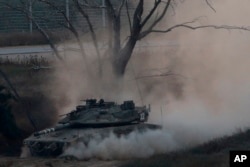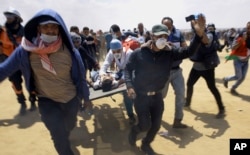A fragile truce appears to be holding on the tense Israeli border with the Hamas-ruled Gaza Strip.
Hamas and other Palestinian militant groups have agreed to a cease-fire, a day after their biggest mortar and rocket barrages on southern Israel since the Gaza War four years ago.
The attacks on Tuesday sent Israeli civilians running to bomb shelters as air raid sirens wailed.
Israel responded with heavy airstrikes. The military said it hit more than 80 of what it said were "terrorist" targets including Palestinian training camps, weapons depots and a smuggling tunnel that could be used for cross-border attacks.
Egypt, which shares a border with both Gaza and Israel, stepped in and convinced Palestinian militant groups to accept a truce.
Islamic Jihad spokesman Daoud Shihab said his faction "does not want an escalation or war." But he warned Israel that the Palestinians have nothing to lose in light of a crippling Israeli blockade on Gaza imposed a decade ago.
Palestinians have been holding mass marches on the Gaza frontier for the past two months in an attempt to break the blockade.
More than 110 Palestinians have been killed as Israeli troops used live fire to prevent a breach of the border fence. The carnage has brought international condemnation on Israel for an alleged excessive use of force.
Israel has not formally agreed to the cease-fire on grounds that it does not negotiate with terrorist organizations. Cabinet Minister Tzachi Hanegbi says Israel's Gaza policy is based on deterrence.
He warned that those who attack Israel will face a harsh military response.
Israeli officials say the formula is simple: Quiet will be met with quiet, and fire with fire.






